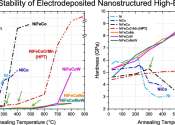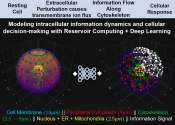This modified stainless steel could kill bacteria without antibiotics or chemicals
An electrochemical process developed at Georgia Tech could offer new protection against bacterial infections without contributing to growing antibiotic resistance.

An electrochemical process developed at Georgia Tech could offer new protection against bacterial infections without contributing to growing antibiotic resistance.
Nanomaterials
May 20, 2024
0
129

Two-dimensional materials such as graphene promise to form the basis of incredibly small and fast technologies, but this requires a detailed understanding of their electronic properties. New research demonstrates that fast ...
Nanomaterials
May 17, 2024
0
147

Researchers led by Prof. Zhang Zairong from the Shanghai Institute of Organic Chemistry of the Chinese Academy of Sciences have identified a post-translational topogenesis pathway for the folding and assembly of multi-spanning ...
Molecular & Computational biology
May 17, 2024
0
1

The interaction of solids with high-intensity ultra-short laser pulses has enabled major technological breakthroughs over the past half-century. On the one hand, laser ablation of solids offers micromachining and miniaturization ...
Optics & Photonics
May 14, 2024
0
1

Researchers have made a breakthrough in understanding the stabilization mechanism of surface structures in high-capacity, high-nickel cathode materials through single-element doping in their collaborative research through ...
Analytical Chemistry
May 13, 2024
0
4

Efficient detection of single optical centers is crucial for applications in quantum computing, sensing, and single-photon generation. For example, nitrogen-vacancy (NV) centers in diamond have made breakthroughs in high-precision ...
Optics & Photonics
May 9, 2024
0
34

Nanostructured high entropy alloys—metals made from a chaotic mix of several different elements—show a lot of promise for use in industries such as aerospace and automotive because of their strength and stability at high ...
Nanomaterials
May 7, 2024
0
117

The late physicist Joseph Polchinski once said the existence of magnetic monopoles is "one of the safest bets that one can make about physics not yet seen." In its quest for these particles, which have a magnetic charge and ...
General Physics
Apr 26, 2024
6
1217

Cells constantly navigate a dynamic environment, facing ever-changing conditions and challenges. But how do cells swiftly adapt to these environmental fluctuations?
Cell & Microbiology
Apr 24, 2024
0
167

Living beings can evolve to lose biological structures due to potential survival benefits from such losses. For example, certain groups of ray-finned fishes show such regressive evolution—medakas, minnows, puffera, and ...
Plants & Animals
Apr 23, 2024
0
20
An ion is an atom or molecule in which the total number of electrons is not equal to the total number of protons, giving it a net positive or negative electrical charge. The name was given by physicist Michael Faraday for the substances that allow a current to pass ("go") between electrodes in a solution, when an electric field is applied. It is from Greek ιον, meaning "going".
An ion consisting of a single atom is an atomic or monatomic ion; if it consists of two or more atoms, it is a molecular or polyatomic ion.
This text uses material from Wikipedia, licensed under CC BY-SA